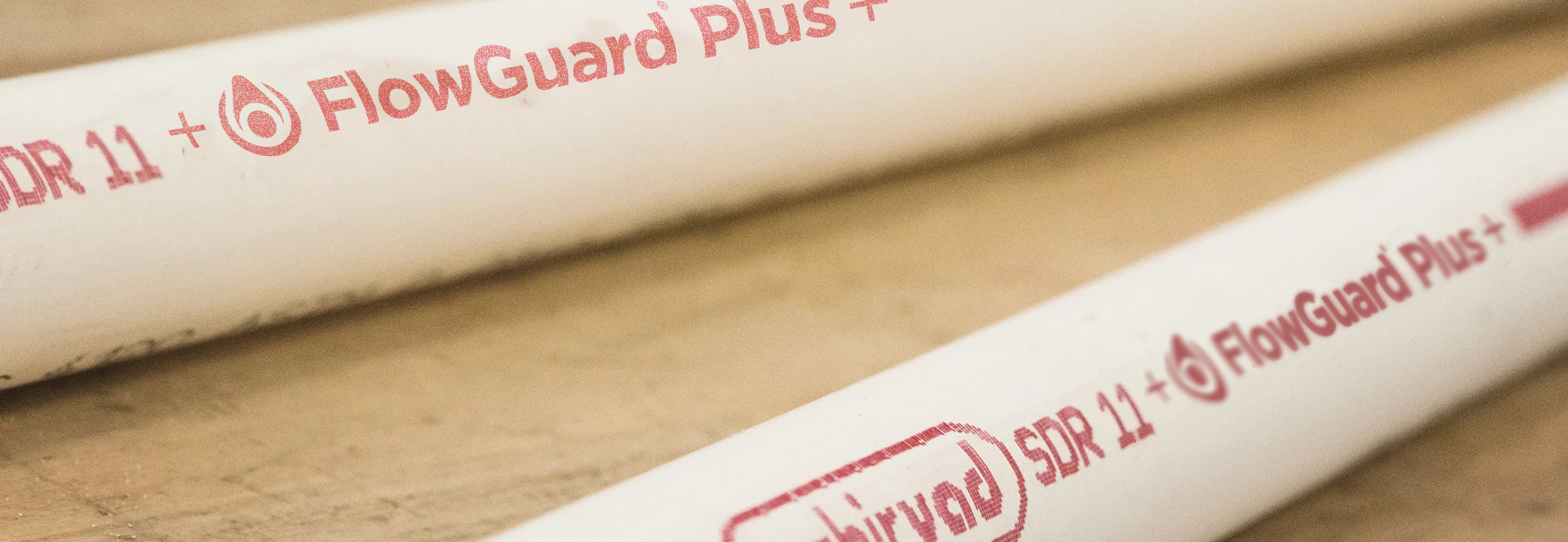
What is FlowGuard® Plus CPVC Pipe Used For?
What is CPVC Pipe Used For?
CPVC (chlorinated polyvinyl chloride) is a strong, durable material that has been successfully used in plumbing applications around the world for more than 50 years.
Originally developed by Lubrizol Advanced Materials, CPVC has the inert ability to withstand high temperature & pressures with the time tested cold fusion solvent cement joining method. This makes the CPVC piping system an ideal material for residential, commercial and industrial piping.
In fact, FlowGuard® Plus CPVC residential and commercial hot and cold plumbing systems installed more than 50 years ago, are still reliably delivering clean, safe water to families and businesses around the world.
Why CPVC is Ideal for Hot & Cold Water Plumbing Systems:
A few reasons why buildings around the world trust CPVC
CPVC pipes and PVC pipes are not the same; the following are just a few of the reasons why homes around the world trusts CPVC pipe and fittings:
Life of the System
CPVC pipes are durable and provide long life when used as per manufacturer's guidelines.
FlowGuard Plus plumbing systems are designed for a service life of 50 years and can withstand hot & cold water for the entire lifetime.
Safe, Clean Water Quality
Major international agencies, such as NSF International, test and approve materials for use in potable water applications. These approvals assure that FlowGuard Plus CPVC does not transfer any harmful and dangerous products to the drinking water it transports.
In the case of FlowGuard Plus CPVC, our material is approved for all potable water systems and, being inert, does not contaminate the potable water supply even after years of use.
Joint Strength
CPVC pipe and fittings are cold welded together, using solvent cement. CPVC solvent cements chemically fuse a pipe to a fitting at the molecular level. Solvent cemented joints, once properly installed, become homogenous and the strongest part of the pipe system, ensuring no leakages over the lifetime of the system.
Chlorine Resistance
Chlorine is used as a disinfectant for water, with strong oxidising properties which can lead to failure of many materials like PPR, PEx & corrosion in metallic pipes. However CPVC is an inert material and has no reaction to the disinfectant (chlorine) in water and the life of the piping systems remain unaffected, even with higher dosages of chlorine in water.
Biofilm Resistance
Water distribution systems are ideal for bacterial growth, however CPVC pipes do not contribute to bacterial growth, due to the smooth surface of the system. Multiple international studies have confirmed that CPVC pipe consistently outperforms copper pipe and all other plastic piping materials, especially PPR, with regard to its ability to resist the formation of biofilms.
Fire Resistance
CPVC pipes are fire resistant and will not support combustion. In other words, CPVC won’t help to spread a fire, unlike other plastics that can catch fire and continue to burn after the source has been removed.
Not All CPVC is the Same
It is important to point out that not all chlorinated polyvinyl chloride is the same. Often CPVC pipe systems that don’t hold up over time are because of poor material quality or improper installation.
As the leader and pioneer in CPVC resin technology, FlowGuard Plus CPVC is engineered to be the best performing polymer piping product on the market.
For questions about using FlowGuard Plus CPVC pipe in residential plumbing systems, contact our team of piping systems consultants.

Prasenjit Misra
Prasenjit Misra, an accomplished professional, having extensive exposure in plumbing field, currently holds the position of Lead Demand Creation & Business Development of TempRite South Asia division at Lubrizol India.
